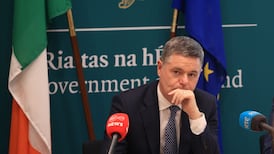The Government has announced details of a pay ceiling for senior roles in the public service and chief executives in commercial State companies.
A general pay ceiling of €200,000 - the current salary for the Taoiseach - will apply to future senior appointments in the public service. The heads of commercial State companies will be subject to a general pay ceiling of €250,000.
Although the rules will only apply to future appointments, Minister for Public Expenditure and Reform Brendan Howlin said those already in the roles with pay that exceeded the agreed ceilings had agreed to a voluntary reduction.
"In light of the ongoing severe economic conditions facing the country there is a need for leadership to be shown by those who hold high office across the public sector," he said. "The Government supports a strong policy of pay restraint within the public sector, including the application of pay caps."
Taoiseach Enda Kenny and other members of the Government have already voluntarily reduced their salary rates.
Mr Howlin said he was reducing the salary ranges that apply to chief executive salaries, which would reduce the salary for all chief executives in a "proportionate manner" but would maintain the weightings between each company.
"This Government is not going to shy away from the tough decisions needed to get our public finances in order but we are going to ensure that these actions are taken in a fair and equitable manner," he said.
Some of the pay cuts, such as those applied to the judiciary, will require legislative amendments, and proposals will be brought before the Oireachtas shortly, Mr Howlin said.
Speaking on RTÉ Radio this afternoon, Mr Howlin said the Government was attempting to deal with the issue of the salaries of incumbents.
"We've looked in some detail about incumbents, and there are contractual issues about applying that immediately, so we are asking people to voluntarily apply the new pay rates. We have been assured by many in the senior echelons in the public service - in fact the vast majority in the past 24 hours - that they will comply with this," he said. "We will seek to impose the same discipline right across all sectors of the public service."
Only the chief executive of the ESB will remain above the €250,000 cap, a role that will attract a salary of €318,000 down from €467,000, and only four will earn above the €200,000 cap - RTÉ, An Post, the Dublin Airport Authority and CIE.
"I think there is an understanding in the general public now that if we are asking people on the very lowest level of income to pay the universal social charge, then it is incumbent on those of us who are earning very good money in the public sector to apply discipline to ourselves. I think this will be seen as an act of solidarity and an act of fairness," Mr Howlin said.
The Department of Finance has asked for all chief executives of semi-states to volunteer pay cuts of 15 per cent or less to bring their wages down to the €250,000 benchmark before new rules can be enforced. All departmental general secretaries who currently earn more than €200,000 have agreed to the voluntary cuts before the new wage structure comes in. Their pay cuts range from 18 per cent to 29 per cent.
The idea of a salary cap was announced in the last budget by the late Brian Lenihan, former finance minister.
Mr Howlin, who will personally approve any breaches of the wage limits, said the five exceptions to the rule were necessary.
The ESB, An Post, CIE, DAA and RTÉ positions are billed as "roles of substantial importance" attracting a person with "exceptional or scarce expertise".
Newly-appointed judges will be subject to a new wage structure but existing members of the judiciary, the majority of whom have offered voluntary pay cuts, await an autumn referendum on their pay.
Sinn Féin's Mary Lou McDonald said the Government's pay reform does not go far enough and insisted it should have adopted her party's call for a 30 per cent cut in pay in politics. "Minister Howlin has described a salary cap of €250,000 as an act of solidarity and fairness; I would call it a gift in the hand," she said. "These kinds of statements from Government are yet another example of just how detached ministers are from the stark economic reality for ordinary people."
Unite trade union regional secretary Jimmy Kelly said the pay cap was a long overdue gesture and should not be used to compare low and high paid workers.
"The Government has announced this as a sign of discipline, leadership and solidarity but they should not imagine it will ease their way to force lower wages on those who cannot afford to feed their families," Mr Kelly said. "Any politician or high paid business leader who likens this salary cap with cuts to the wages of those who have to watch every cent to survive will be greeted with real anger."
Additional reporting: PA











